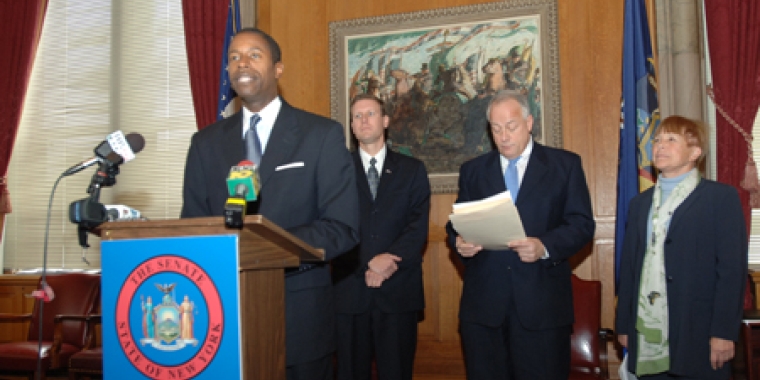
Senate Minority Targets Tax Relief To Those Who Need It Most Amendments Would First Help Struggling Seniors And Working Families
Malcolm A. Smith
January 21, 2007

SenateMinority unveiled two amendments to theMajority property tax rebate plan (S.1-A) scheduled to be debated and voted on today. The amendments would better target tax relief to those who need it most – primarily senior citizens and middle class working families who have been hit hardest by skyrocketing property taxes.
Both the Governor and Senate have proposed cutting property taxes by about $6 billion in an effort to reduce the overall tax burden in New York State – which is the highest in the nation.
"We have had a property tax crisis in New York State for far too long," said Senate Democratic Leader Malcolm A. Smith (D-Queens). "But under the leadership of Governor Eliot Spitzer, and with the support of this Senate Democratic Conference, we will soon see real reform of our property tax system that will bring significant and long term tax relief to our State."
The proposals we've seen are good starting points," Smith said. "Our amendments will strengthen the Senate plan and help make our property tax system more equitable while also targeting immediate relief directly to seniors and middle class New Yorkers who need help now."
Senator William Stachowski (D-Buffalo), ranking Democrat on the Senate Finance Committee, said Senate Democrats are seeking long-term solutions to the State's tax crisis. "The STAR program is a good one,but, in its present form, it does not take a homeowner's income and regional economic differences into consideration. The more we rely on STAR without addressing the structural inequities in our property tax system, the more we exaggerate those inequities."
State Senators Andrea Stewart-Cousins (D-Yonkers) and David Valesky (D-Oneida) will offer amendments, which, if enacted, would address at least some of the inequities in the State's property tax system.
Valesky's amendment to expand the Real Property Tax Credit for seniors is designed to overcome the regressive nature of property taxes by increasing the maximum credit amount for senior citizens from $375 to $1,125, and increasing the maximum credit amount for all others from $75 to $225.
The current Real Property Tax Credit limits have been ineffective in New York because they operate at a modest level and because the amounts of the credit have not been increased in 30 years. The Democratic proposal would greatly expand the program for seniors.
Valesky said, "Low and Middle income New Yorkers, particularly senior citizens living on fixed incomes, have been overwhelmed by skyrocketing Medicaid costs and other unfunded mandates that have lead to double-digit local property tax hikes."
Valesky said his amendment "would target additional relief to the people who have borne the brunt of the growing property tax burden over the last decade, in this case, New York's senior citizens."
Stewart-Cousins will offer an amendment to expand the personal income tax credit, currently allowed only to New York City renters, to the entire state. This would provide immediate tax relief to renters in suburban areas like Westchester County and Long Island, where property tax hikes have dramatically driven up rental costs.
Last year, the State increased the STAR credit for renters living in New York City, raising the refundable credit from $125 to $230 for married couples and $62.50 to $115 for all others.
Stewart-Cousins said, "It is only fair that all tenants in our State receive the same Personal Income Tax credit provided to New York City renters. Many of our suburban communities are among the highest taxed in the nation, and this amendment would bring immediate relief to the tenants in those communities."
Stachowski said the SenateMinority have discussed a number of other tax relief strategies, including "shortening the phase-in period for seniors and working families who most need immediate relief.
"We intend to be fully engaged in tax relief negotiations with the Governor and our colleagues in the Senate and Assembly, and we will bring a number of proposals to the table. We believe, as does the Governor, that a tax relief plan must promote equity and fiscal responsibility and must address the root causes of high property taxes – economic decline, irresponsible government spending, waste and debt," Stachowski said.
Share this Article or Press Release
Newsroom
Go to NewsroomSpring / Summer Newsletter 2013
June 4, 2013

5th Annual Health Walk on June 15
May 31, 2013


